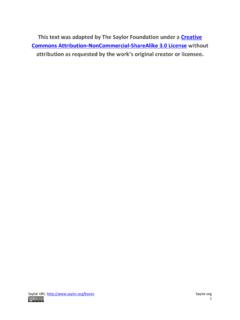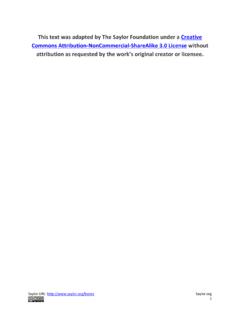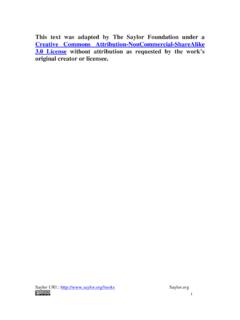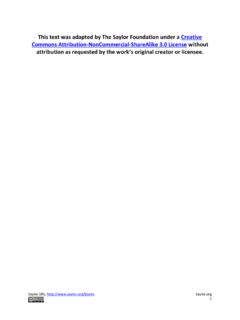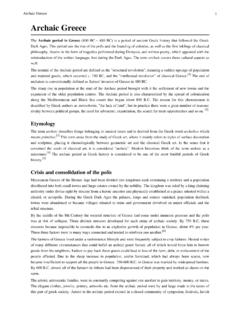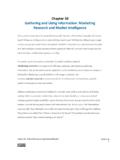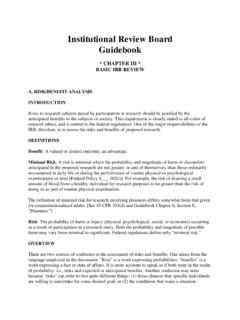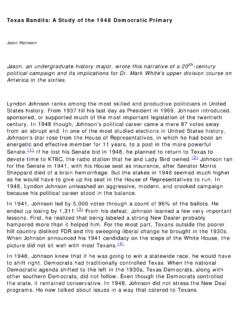Transcription of 1948 Arab Israeli War - Saylor
1 1948 arab Israeli War11948 arab Israeli WarThe 1948 arab Israeli War, known to Israelis as the War of Independence or :Hebrew( , Milkhemet Ha'atzma'ut or Milkhemet HA'sikhror) or War of Liberation , :Hebrew(Milkhemet Hashikhrur) was the first in a series of wars fought between the State of Israel and its arab neighboursin the continuing arab - Israeli war commenced upon the termination of the British Mandate of Palestine and the Israeli declaration ofindependence on 15 May 1948 , following a period of civil war in 1947 1948 . The fighting took place mostly on theformer territory of the British Mandate and for a short time also in the Sinai Peninsula and southern Lebanon.
2 [1]Much of what Arabs refer to as The Catastrophe (Arabic: , al-Nakba) occurred amidst this war concluded with the 1949 Armistice separation of World War II, on May 14, 1948 , the British Mandate ofPalestine came to an end. The surrounding arab nations were alsoemerging from colonial rule. Transjordan, under the Hashemite rulerAbdullah I, gained independence from Britain in 1946 and was calledJordan, but it remained under heavy British influence. Egypt, whilenominally independent, signed the Anglo-Egyptian Treaty of 1936 thatincluded provisions by which Britain would maintain a garrison oftroops on the Suez Canal.
3 From 1945 on, Egypt attempted torenegotiate the terms of this treaty, which was viewed as a humiliatingvestige of colonialism. Lebanon became an independent state in 1943,but French troops would not withdraw until 1946, the same year thatSyria won its independence from 1945, at British prompting, Egypt, Iraq, Lebanon, Saudi Arabia,Syria, Transjordan, and Yemen formed the arab League to coordinatepolicy between the arab states. Iraq and Transjordan coordinatedpolicies closely, signing a mutual defence treaty, while Egypt, Syria,Lebanon, and Saudi Arabia feared that Transjordan would annex partor all of Palestine, and use it as a basis to attack or undermine Syria,Lebanon, and the 29 November 1947, the United Nations General Assemblyapproved a plan to resolve the arab -Jewish conflict by partitioningPalestine into two states, one Jewish and one arab .
4 Each state would comprise three major sections, linked byextraterritorial crossroads; the arab state would also have an enclave at Jaffa. With about 32% of the population, theJews would get 56% of the land, though this did not add significantly to the amount of arable land, and wasconsidered insufficient to feed the expected immigrant Jewish population.[2] The Jewish area would contain 499,000 Jews and 438,000 Arabs, and most of this territory was in the inhospitable Negev Desert in the south. ThePalestinian Arabs would get 42% of the land, which had a population of 818,000 Palestinian Arabs and 10,000 consideration of its religious significance, the Jerusalem area, including Bethlehem, with 100,000 Jews and anequal number of Palestinian Arabs, was to become a Corpus separatum, to be administered by the UN.
5 [3] The Jewishleadership accepted the partition plan, without reservation, as "the indispensable minimum,"[4] glad to gain1948 arab Israeli War2international recognition but sorry that they did not receive more[5] and on May 14, 1948 Israel was declared a State,with a provisional government taking charge from the moment of the termination of the Mandate on May 15.[6]Arguing that the partition plan was unfair to the Arabs with regard to the population balance at that time, therepresentatives of the Palestinian Arabs and the arab League firmly opposed the UN action and even rejected itsauthority to involve itself in the entire matter.
6 [7] They upheld "that the rule of Palestine should revert to itsinhabitants, in accordance with the provisions of the Charter of the United Nations."[8] [9]1947 1948 Civil War in Mandatory Palestine 1948 PalestinianexodusMain articles1948 Palestinian exodus1947 48 civil war1948 arab - Israeli WarCauses of the exodusNakba DayPalestine refugee campsPalestinian refugeePalestinian right of returnPresent absenteeTransfer CommitteeResolution 194 BackgroundBritish Mandate of PalestineIsrael's declaration ofindependenceIsraeli-Palestinian conflict historyNew HistoriansPalestine Plan Dalet1947 partition plan UNRWAKey incidentsBattle of HaifaDeir Yassin massacreExodus from LyddaNotable writersAref al-Aref Yoav GelberEfraim Karsh Walid KhalidiNur Masalha Benny MorrisIlan
7 Pappe Tom SegevAvraham Sela Avi ShlaimRelated categories/listsList of depopulated villagesRelated templatesPalestinians1948 arab Israeli War3In the immediate aftermath of the United Nations' approval of the Partition plan, the explosions of joy amongst theJewish community were counterbalanced by the expressions of discontent amongst the arab community.[10] Soonthereafter, violence broke out and became more prevalent. Murders, reprisals, and counter-reprisals killed dozens onboth war did not officially begin until the end of the Mandate in May 1948 , but following the United Nations vote topartition the Palestine Mandate on November 30, 1947, the Mandate had became engulfed in a civil war between theArab and Jewish communities.
8 [11] Starting on November 30, 1947 bombings and rioting became daily events.[12] Onthe night of the partition vote, a Jew was shot down in the Camel market of Jaffa; in the Mandate's main jail at Acre, arab and Jewish prisoners staged a bloody prison riot; in Haifa, cars in Jewish neighbourhoods were shot at, and allover the Mandate arab crowds stoned cars driven by Jews.[11] On December 1, the Swedish and Polish consulateswere fire-bombed in retaliation for those two nations' votes for partition, while Jewish shops and cafes were bombedall over the Mandate, with one synagogue destroyed by arson.
9 [12] The arab Higher Committee ordered a generalstrike and on December 2 a riot in Jerusalem saw Jewish shops looted and the attempted lynchings of severalJews.[13]In October 1947, Israel Galili, the Chief of Staff of the Hagana wrote:As far as we know, it is the Mufti's belief that there is no better way to 'start things off' than by means ofterror, isolated bombs thrown into crowds leaving movie threatres on Saturday nights. That will start theball rolling. For no doubt the Jews will react, and as a reaction to a reaction there will be an outbreak inanother place .. until the whole country will be stirred up, trouble will be incited, and the neighbouringArab countries will be compelled to start a 'holy war' to assist the Palestinian Arabs".
10 [14]On December 4, 1947 some 120-150 Palestinians led by Hasan Salama attempted to overrun kibbutz Efal outside ofTel Aviv.[15] This was the first attempt to take a kibbutz, and was beaten off with the loss of about 70 Palestinianskilled.[13] In response to the violence, Ben-Gurion ordered the Hagana in December 1947 to begin the transition intoa regular army.[14] Initially the Hagana's role was defensive, but starting on December 9, 1947 following attacks onJewish road traffic, the Hagana was ordered by its operational chief, Yigael Yadin, to call out retaliatory attacks onArab vehicles and villages that were the homes of Palestinian fighters, and the assassination of the leaders of thePalestinian groups.
